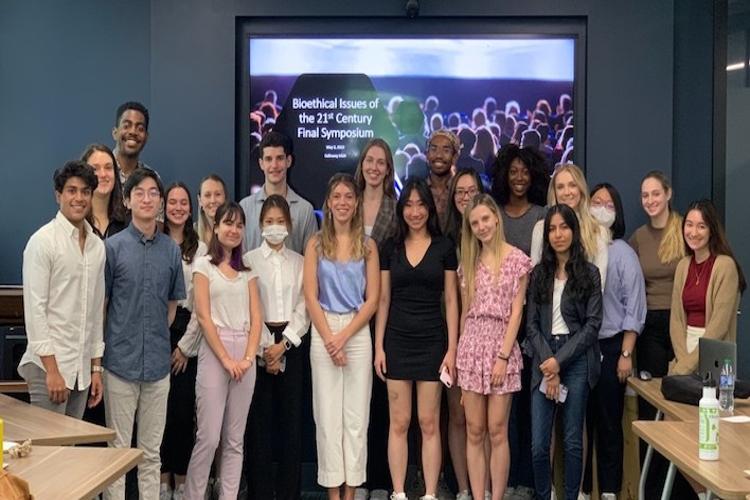Reflections of 2021-2022 inaugural Robertson Graduate Fellow in Science & Society

By Jordan Lewis
PhD Candidate | Population Biology, Ecology & Evolution
Morran Lab | Dept. of Biology, Emory University
Nat C. Robertson Fellow in Science & Society | Emory Institute for the Liberal Arts
In Spring 2021 I was fortunate enough to be selected as the inaugural Nat C. Robertson Fellow in Science and Society, a fellowship that seeks to increase collaborative interdisciplinary learning across experience levels. For me, this experience has been a coalescing of various threads of my academic training and personal interests and has thus made my final year of my Doctoral studies one of the most unique and enjoyable experiences of my life. I have no doubt that the impacts of the Robertson Fellowship and my experiences with the ILA will be with me deep into my career and my life.
I am a 5th-year Ph.D. student in the Population, Ecology & Evolution Graduate Program. My research centers around factors that either facilitate or impede adaptive evolution and the use of laboratory experiments to test evolutionary theory. When I arrived at Emory in the Fall of 2017, I quickly was introduced to Dr. Ari Eisen through his (one of many) appointments in the biology department. After striking up a conversation about my undergraduate interests (I used to tutor ethics & religion), Dr. Eisen encouraged me to pursue bioethics at Emory and told me about the amazing interdisciplinary work being done on campus. This led to me completing a doctoral certificate in bioethics and eventually, stumbling into the ILA via the Robertson Fellowship in 2021. I soon realized that those fruitful conversations with Dr. Eisen were just a taste of the general comradery of the ILA and the experiences I would have with the faculty and staff within it.
My Fellowship proposal focused on contemporary bioethical issues, and both my Fall and Spring classes approached the issue from different angles. This past Fall (2021), Dr. Robyn Fivush and I co-taught "Science and the Nature of Evidence: Medical Uncertainty", where we focused on how the uncertainty inherent to the scientific method trickles down to our ethical choices in healthcare and research. This spring (2022), I taught my own special topics course called "Bioethical Issues of the 21st Century", where we covered the principles of biomedical ethics, the historical underpinnings of our current understanding of various contemporary issues (and how technology is impacting these arguments), and lastly, issues that may soon be of particular importance. The photo attached is from the latter’s final symposium, where they presented policy recommendations on bioethical issues. Both experiences have been among the most enriching I have had in my Ph.D., and both have made me an exponentially better instructor. The opportunity to develop my own course materials from my interests AND the ability to learn from amazing faculty like Dr. Fivush has helped me develop both my teaching philosophies and strategies. Further, my experiences in the classroom were not only the product of Dr. Fivush & Dr. Eisen’s feedback but were evident of the amazing teaching environment created between the students and the ILA faculty and staff. Due to its very nature, the ILA attracts students who have a love of learning and a natural curiosity, and this was obvious in every class I taught. They pursued tough questions and approached each ethical controversy with a level of understanding far beyond their years. While it may sound cliche, ultimately, I think that many of the students I end up teaching over my career will have a better experience because of my experiences in the ILA.
In the Fall, I plan to defend my dissertation and transition to a post-doctoral role. I was recently awarded the National Science Foundation Postdoctoral Research Fellowship in Biology and will be moving to Connecticut in October to begin work at Yale University. I will be joining Dr. Paul Turner in a project looking at the evolution of phages (naturally occurring, bacteria-specific viruses), with the end goal of alleviating our dependence on antibiotics and the rise of bacterial resistance to them. Coincidently, a portion of my outreach for my grant will be teaching a "Science & Society" style course for non-majors, focusing on how Ecology and Evolution research directly impact humans or our understanding of key processes we utilize. The Robertson fellowship directly prepared me to be able to communicate my science and its importance, while integrating information from other fields of research. Even past the fellowship itself, I can say that my entire Emory experience would be completely different without this amazing little department.